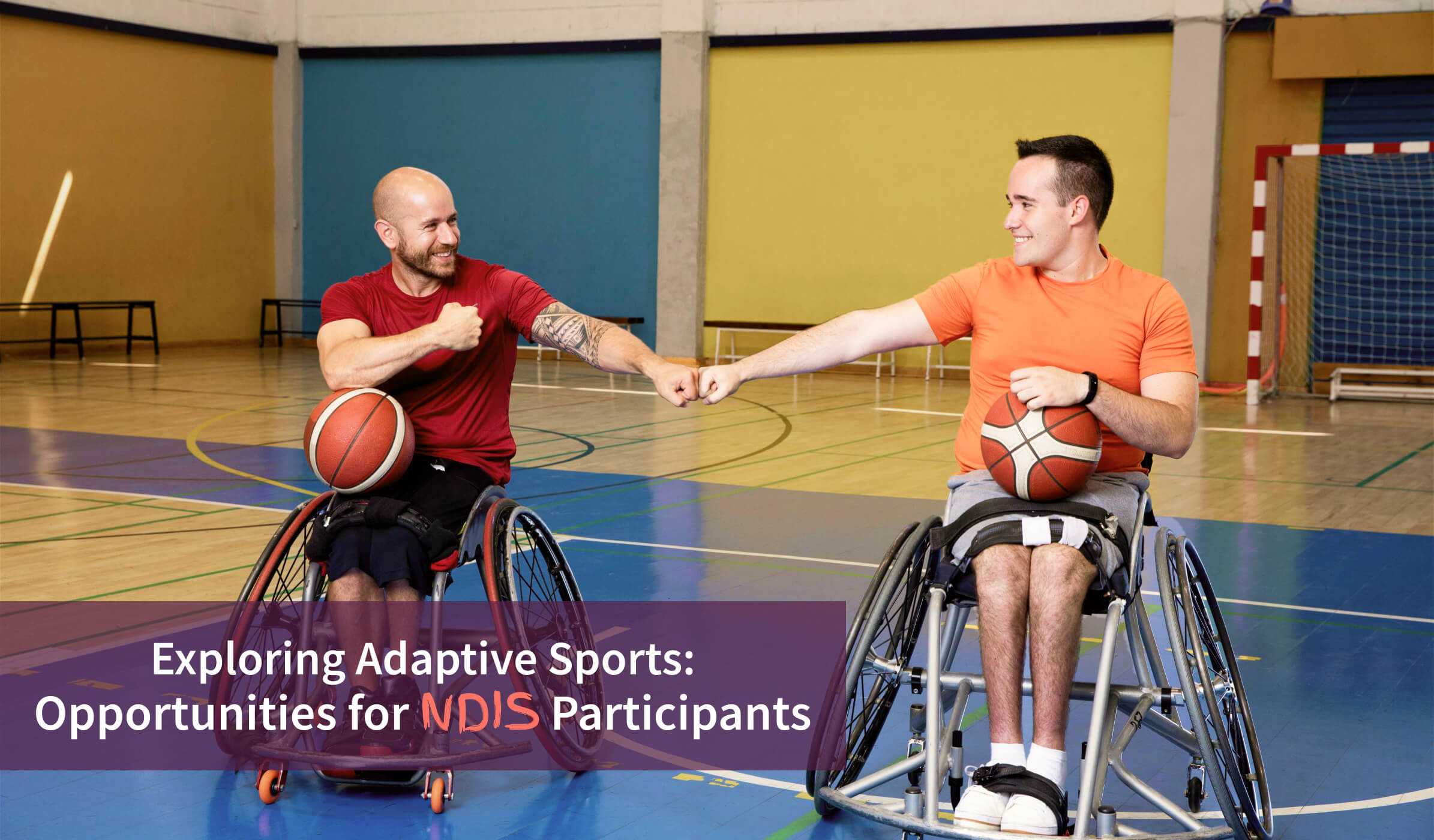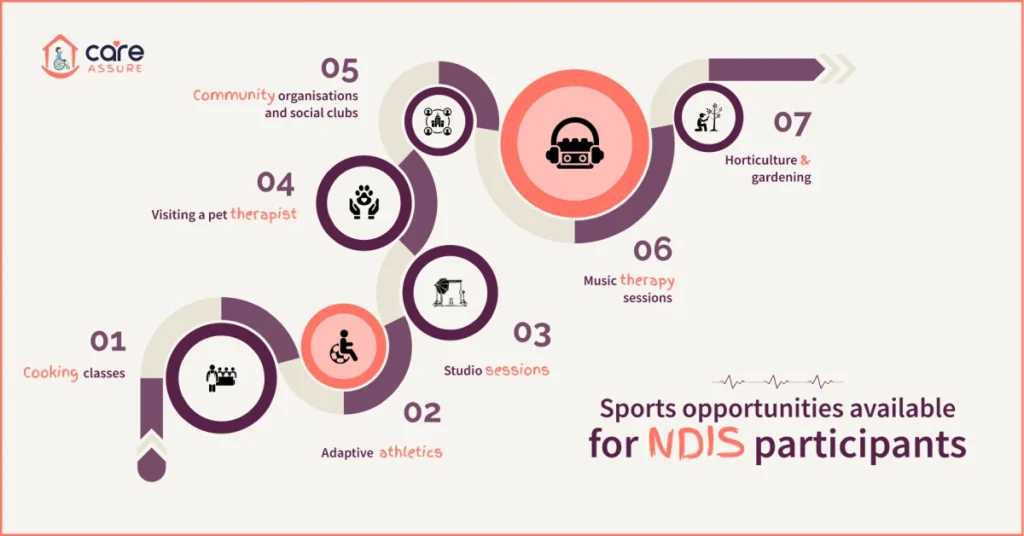Exploring Adaptive Sports: Opportunities for NDIS Participants
February 19, 2024
|By Careassure
|11 min read

It has been proven over the years how effective sports are to everyone. It keeps you alive and healthy during and after the activities. And the best kind? Group sport activities! Participating in group sports helps people meet new people, grow as individuals, and have fun. NDIS group events can be a great way for people with disabilities to improve their physical, mental, and emotional health. This article highlights the top benefits of NDIS sports activities. Also, we will be discussing the top sports opportunities for people with disabilities. So, let's dive in and check out these exciting chances to meet new people and improve your lifestyle!
What are recreational and sporting events for people with disabilities?
Including people with disabilities in sports and other recreational activities is growing in contemporary culture. These opportunities, like other disability programs, help people enhance their emotional and physical well-being. This has both short- and long-term positive effects. Sports and leisure activities bring people together and teach them valuable social and life skills. On top of that, they make it possible for people of all abilities to interact with one another. This can make positive and necessary contributions to the community.
Benefits of NDIS-funded sports events
Activities like sports and leisure help improve society in many ways. They bring people together and make them feel welcome. This is crucial for learning and enhancing critical social and life skills. Inclusive sports for disabilities help people get out into the community and enjoy themselves. This, in turn, is good for their health and happiness. Let’s look at how disability sports and leisure can benefit PWD.

1. Getting better mental and physical health
Nationwide adaptive sports are great ways to improve mental and physical health. NDIS sports activities offer a tremendous chance to do this. The deliberate planning behind these activities ensures they enhance overall health, boost physical fitness, and boost emotional well-being and fulfilment. Individuals with disabilities can improve their physical fitness levels by doing these fun tasks.Participating allows People to get stronger, more flexible, and can handle longer distances. These sports include adaptive sports, exercise classes, and outdoor activities. Participating in wheelchair basketball, swimming, or adapted yoga classes can help people improve their physical skills and enjoy the many benefits of living an active life.
Recreational events paid for by the NDIS have a big effect on people's mental health and well-being. Research has shown that doing things you enjoy and that make you feel good can help lower stress, anxiety, and sadness. People can express themselves, be creative, and relax uniquely through it. This will boost their self-esteem and sense of success. Participating in these activities allows people to have fun, become stronger, and develop a positive view of life.
2. Find better ways to sleep
A needed sleep can cure all the pains and tiredness one feels at a particular time. Your background or nationality doesn't matter; everyone knows sleep is essential for your health. It's vital for the brain's ability to store and consolidate memories, control emotions, and recover from harm. Your ability to concentrate and get things done can benefit from a good night's sleep. Stress, pain, medication, and mental health issues are just a few of the reasons why some people have trouble sleeping.NDIS recreational events help people with disabilities make friends and get involved in their communities. These are benefits that favour individuals and groups. These activities create places where everyone feels welcome and can make essential connections, build support networks, and find a sense of belonging.
3. Creating social links and improving community participation
NDIS recreational events help people with disabilities make friends and get involved in their communities. These are benefits that favour individuals and groups. These activities create places where everyone feels welcome and can make essential connections, build support networks, and find a sense of belonging.Participating people can meet others with similar hobbies, challenges, and experiences. Individuals with disabilities can make friends that go beyond the program and into their personal lives by participating in these events. People who meet in these welcoming places often become very important sources of support, understanding, and friendship. You can check out Inclusive events NDIS can make available for its participants.
4. Building up skills and independence
Sports events are significant for helping people with disabilities learn essential skills and become more independent. NDIS and sports participation can help individuals learn new skills, improve old ones, and gain confidence. This will help them handle their daily lives more freely in a safe and supportive setting.Activity options include art workshops, music lessons, cooking classes, and various games for people of all skill levels. Through these tasks, people can improve their ability to talk to others, solve problems, and work with others. They learn new ways to express themselves creatively, work together, and handle different scenarios.
5. Assist in establishing objectives and confidence
Aiming for, working toward, and finally accomplishing goals is a critical component of many leisure and sporting pursuits. As a means of goal-setting, these activities can help people with disabilities feel more secure in themselves and their skills. This highly effective method of inspiring others has the potential to become a skill that will serve them well both on and off the field. Dividing the tasks into smaller, more manageable goals makes people feel like they're progressing. They experience a surge of pride and satisfaction when they achieve these objectives. It improves their self-worth and encourages them to pursue further success in all areas of life.6. Promoting a sense of belonging and acceptance
Sports events make people with disabilities feel like they belong and are accepted. You can feel welcome and valued at these events because they value differences, celebrate individual skills, and promote diversity. One important thing about NDIS-funded events for fun is that they are open to everyone. People with disabilities are urged to participate in activities that fit their interests and preferences. Everyone feels included and valued with this method, which helps people feel like they belong.Inclusion in recreational events gives people with disabilities a chance to show off their unique skills and talents. When the focus changes from limitations to strengths, people feel free to be themselves and speak their truth. These activities break down societal stereotypes and question people's ideas about disabilities. This is achieved by recognising and celebrating each person's abilities.
Sports opportunities available for NDIS participants
Discovering adaptive athletic pursuits can be challenging. You don’t have prior knowledge and probably don’t know how to start. Below are NDIS disability sports events you can do easily.

1. Cooking classes
For people who love cooking, it is considered therapeutic. Starting a cooking class will have all the participants active and happy. It is also an excellent opportunity to meet new people while improving your culinary abilities. Participating in these group events is a great way to acquire great cooking tips and share the joy of making and eating tasty food.2. Adaptive athletics
People with disabilities can participate in adaptive sports and show off their skills in a fun, supportive environment. Wheelchair basketball and adaptive swimming are only two examples of the many adaptive sports available to people with a wide range of disabilities.3. Studio sessions
People with disabilities might find a creative voice in arts and crafts classes. Inspiring people to discover their artistic sides, acquire new skills, and develop self-confidence, these classes include a wide range of media, from painting and ceramics to mixed media.4. Visiting a pet therapist
Being with animals can have a calming and therapeutic effect on people. Participating in pet therapy sessions can help PWDs improve social skills, alleviate stress, and boost emotional health. This can be done by allowing them to form bonds with professionally trained animals. The sessions have the potential to be entertaining as well as instructive.5. Community organisations and social clubs
A sense of community and opportunities for meaningful friendships can be yours when you join a disability-focused social club or support group. Regular get-togethers, excursions, and member-focused events are commonplace in these associations.6. Music therapy sessions
People with disabilities can find a unique way to express themselves and connect with others via music therapy. In a group setting, people can feel safe expressing themselves via rhythm, movement, and song. There can be a sense of belonging and happiness when people come together to play music, sing, or listen to the tunes.7. Horticulture & gardening
Some people find that gardening and other horticultural pursuits help them cope with their disability. Incorporating physical movement, sensory discovery, and the delight of plant growth into group gardening sessions can have many positive effects. Everyone is welcome to start their little garden or pitch in to keep the communal ones strong.Conclusion
Participation in adaptive sports and other forms of recreational activity can improve the physical and emotional health of individuals with disabilities. Additionally, it provides a great setting to practise fundamental social and life skills. Australians have an abundance of options when it comes to accessible sports and recreational activities.
As a registered NDIS Service Provider, Care Assure can ensure you have the necessary support to engage in the recreational activity or sport you choose. You can contact us now if you need assistance finding the ideal exercise. We have NDIS-approved sports available for our participants regularly. You don’t want to miss what it’s like doing what you enjoy most!
Frequently Asked Questions (FAQs)
Adaptive sports are physical activities that have been modified or designed to accommodate individuals with physical disabilities. These modifications can include specialised equipment, techniques, and strategies to allow participants with a range of abilities to participate fully and enjoy sports. NDIS makes efforts to ensure there are adaptive sports opportunities for participants. This can help them in various ways of their daily living.




